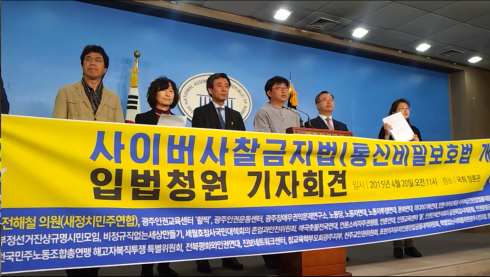
The ‘Urgent Action Network against Cyber Surveillance’ (Urgent Action Network), which is composed of 19 groups including human rights organization, labor party and labor unions, held the press conference to submit the petition for legislation of so-called ‘cyber surveillance prohibition act’, actually a revised bill of ‘Protection of Communications Secrets Act’(PCSA), in the national assembly on April 20, 2015. The petition, in which 2,910 people have signed, will be introduced and proposed in the national assembly by haecheol Jeon, an assemblyman of the New Politics Alliance for Democracy, the main opposition party, and a member of legislation and justice committee.
Press conference in the national assembly on April 20, 2015
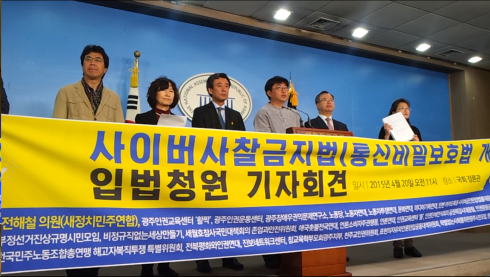
The Urgent Action Network has made a team at the end of last year, which is lead by professor Hojung Lee, and developed the civil society proposal for revising current legislative system related to cyber surveillance, to prohibit surveillance by investigative and intelligence agencies and protect the right to privacy of users. The rationale and major points of the proposal was introduced in the event, ‘joint assembly of cyber surveillance victims :prologue for counterattack’, held on March 1, 2015. The proposal was further discussed with broader civil society experts and activists in the workshop which was held in Franciscan Education Center on April, 3.
Civil Society Workshop on April, 3
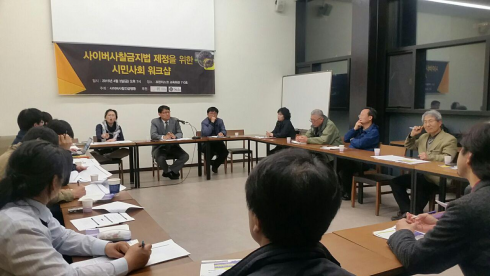
After that, 33 civil society organizations including those of Urgent Action Network held a press conference in the Gwanghwamun Gate Square on April, 7 and announced the start of petition campaign for legislation of ‘cyber surveillance prohibition act’, that ordinary citizens and users who support the bill can sign on the petition. As a way of promotion of the petition, there was people’s joint association, held on April 18, where petitioners discussed the problem of cyber surveillance and collected signatures from citizens on the street. For two weeks until the press conference in the national assebly on April 20, 2,910 people have signed the petition through online and on the street.
Press conference announcing the start of petition campaign on April 7
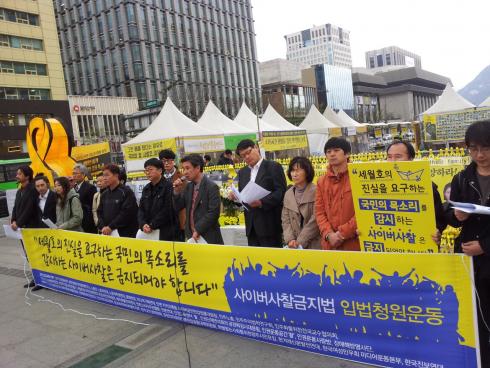
Petition campaign on the street
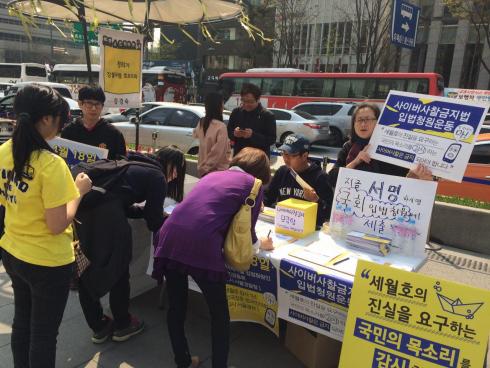
The major points of proposed bill are as follows :
Clarification of Related Terms and The Scope of Application of The Aaw
- add right to self-determination of personal information on communication in the purpose provision
- declare that communication secrets of persons who communicate with suspect, but are not related to criminal charges, and communications of suspect which are not related to criminal charges should be protected
- define interception of tele-communication as tele-communication in transit.
- define the scope of metadata as ‘past’ metadata. (currently, metadata, especially location trace information, in future compared to the time of issuing of warrant, are often provided to investigative agencies for the purpose of location trace of suspect)
- define subscriber’s personal information as a kind of metadata and apply a warrant requirement. (currently, subscriber’s personal information is not defined in the PCSA, but in the Telecommunication Business Act, which doesn’t require a warrant for investigative agencies to access them)
- define location trace information seperately and strengthen a warrant requirement.
- expand the exclusionary rule of illegally obtained evidence to metadata and location trace information as well as interception.
Stricter Regulation of Interception of Communication
- strengthen the requirement of investigative agencies asking for warrant for interception of communication, by deleting ‘planning of crime’ from the requirement, not to misuse the provision for the purpose other than ‘investigation of crime’(currently, investigative agencies can ask a court for issuing a warrant when there is good reason to doubt planning, committing, or having committed of crime), and changing the requirement to (in the case that arrest of a criminal or collection of evidence is) ‘impossible or substantially difficult’ from ‘difficult’.
- limit the target of interception of communication to suspect. (currently, the person who is being internally investigated can be the target)
- require more detailed explanation of the necessity for warrant
- limit the period of interception to 1 month (from currently 2 month)
- delete the current provision of interception for national security, because the requirement of the provision is ambiguous and it allows inteception without criminal charges, which is violating proportionality.
- necessitate surely post-warrant in the case of ‘urgent interception’, and stop interception and abolish collected materials immediately when post-warrent is not allowed to issue.
- oblige judicial police officer (investigative agency) to notify to who were intercepted the fact that their communications were intercpeted ‘within 30 days after the end of interception’, to strengthen the right of citizen to be notified. (currently, investigative agencies are required to notify to the target ‘within 30 days after prosecution or non-prosecution disposition’, which has often been misued by investigative agencies delaying to decide whether to prosecute or not, so leaving the target not knowing the fact that his/her communication was intercepted for a long time.)
- broaden the objects who are eligible to be notified to all who were subject to interception of communication. (currently, only the target of interception could be notified, and other persons who was subject to interception by communicating with the target are not notifed the fact that their communications were intercepted.)
- define the contents that should be notifed in more detail.
- newly setting up provision of preservation and abolition of materials collected from interception.
- delete the provision of ‘Cooperative Obligation of Operators of Telecommunications Business’
New Provision on Seizer, Search and Inspection of Stored Communications
- strengthen the regulation of seizer, search and inspection of stored communications such as email and messages of messenger services, to the similar level of interception. (currently, stored communications have been treated by the Criminal Procedure Act(CPA) but without detailed regulations considering the characteristics of communications)
- define preservation of integrity of stored communications
- define the right of participation of suspect in the process of seizer, search and inspection of stored communications by allowing the right of expression of opinion in the process and by making opinions of suspect to be recorded in a report. (In general, seizer and search of stored communications are carried out at the site of the server of service provider which store communications of suspect, not home of suspect, without even suspect’s knowing.)
- require notifying to not only suspect but also other persons whose communications were included in the stored communications, of the fact that seizer, search and inspection of their communications was carried out.
Strict Regulation of Metadata and Location Trace Information
- define subscriber’s personal information as a kind of metadata and apply a warrant requirement.
- strengthen the requirement of location trace information to the similar level of interception because provision of location trace information can have the effect of real-time interception.
- new provision on so-called ‘base station investigation’, through which investigative agencies can collect all mobile phone numbers captured by base station around certain area at a certain time, which is misued to identify people who participate in a demonstration. Jinbonet has raised a constitutional petition against base station investigation in 2012.
- require notifying within 30 days after provision of metadata or location trace information
Supervision by The National Assembly
- require reports on interception, seizer/search/inspection, and metadata/location trace information to be submitted to the national assembly and be published to the public ‘quarterly’ for the supervision by the national assembly and assuring the right to know. (currently, just require reports to be submitted to the national assembly half-yearly.)